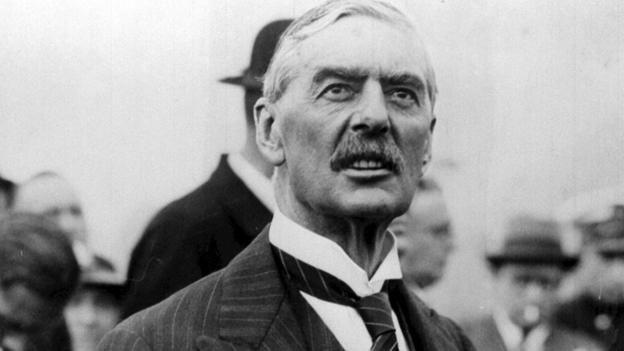Munich: Edge of War gives Neville Chamberlain a makeover
- Published
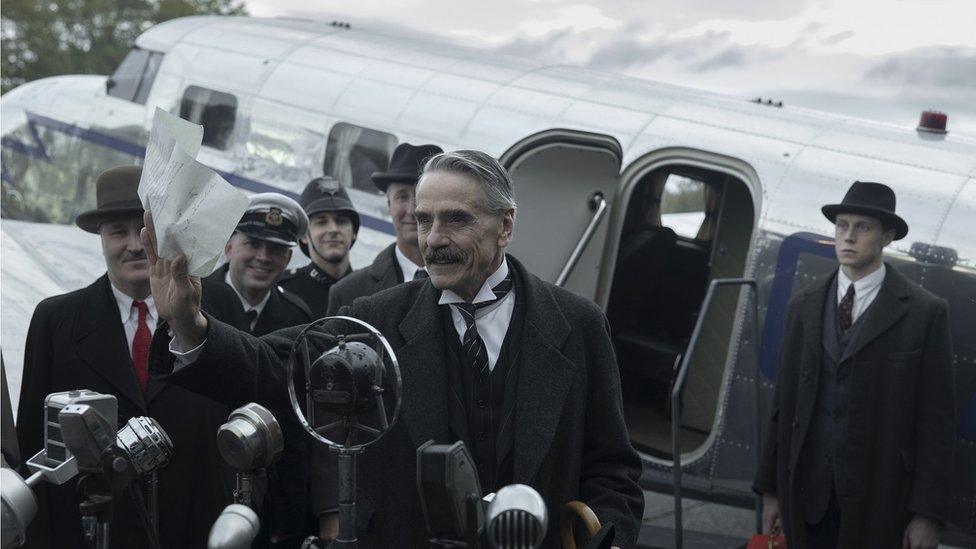
Many historians have been critical of the approach taken by Neville Chamberlain, played here by Jeremy Irons
Neville Chamberlain, a British Prime Minister often overshadowed by his wartime successor Winston Churchill, is getting an image makeover - thanks to the release of a new film and his portrayal by Oscar-winning actor Jeremy Irons.
Munich: The Edge of War, is an adaptation of the Robert Harris bestseller Munich, the story of Chamberlain's attempts to avoid a war with Hitler in 1938, as the Nazi dictator prepared to invade the former Czechoslovakia, now the Czech Republic and Slovakia.
"Chamberlain has come down through history as pretty vilified," Irons argues.
The British PM was photographed waving an agreement with Hitler after the Munich conference of 1938, declaring "peace for our time."
World War Two began a year later, and Chamberlain's words were judged by many as naive. At the time, Chamberlain said that the failure to avert war was a bitter personal blow, and that he didn't think he could have done any more.
Irons and Harris say they had discussed the actor taking the part long before the book was adapted for the screen.
"I am interested when history is reappraised by a deep and intellectual writer such as Robert, who does the research," Irons says.
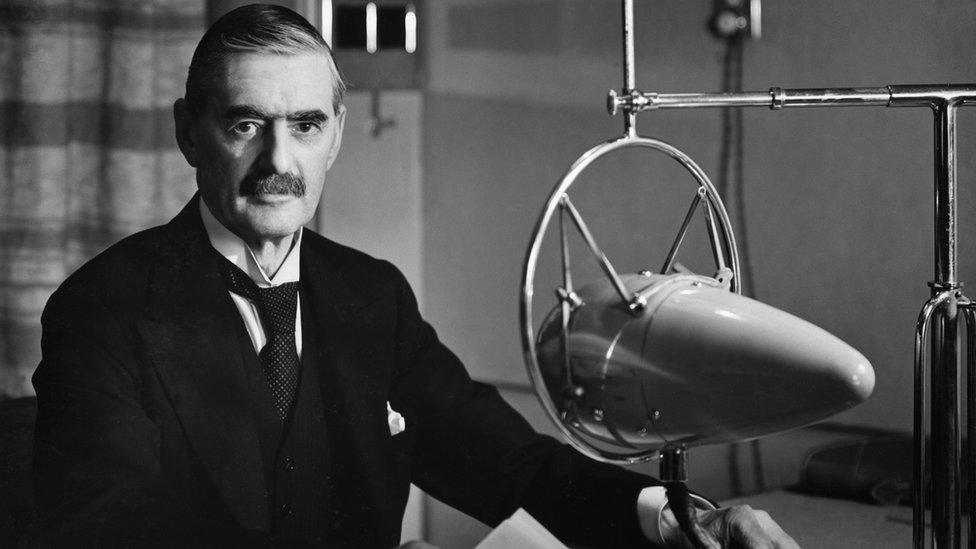
Chamberlain was PM between 1937 and 1940
"Our view of Chamberlain is not perhaps what he deserves, and I was glad for that to be turned into a film. It seems like a timely reappraisal of the period and of the man."
Actors have often portrayed Chamberlain in TV shows and films where Winston Churchill is the main character, such as Into the Storm, starring Brendon Gleason (and Jack Shepherd as Chamberlain), a 2009 film about Churchill's days in office in World War Two.
Most recently, Chamberlain was portrayed by Ronald Pickup in 2017's Darkest Hour, which earned Gary Oldman an Oscar for playing Churchill, a politician who had warned about the threat Adolf Hitler posed to the world.
Harris's depiction of Chamberlain is of an honest politician who was clear about Hitler's intentions. The paper he waved was a private agreement, signed by Hitler and Chamberlain, expressing a joint desire not to go to war again.
"That piece of paper was a trap," Harris argues.
German director
"Chamberlain said that it was a trip wire; he hoped Hitler would stick to his word, but if he didn't, he would have the agreement that Hitler had broken. He may have been wrong to think there was any chance to do a deal with Hitler, but he was right to try it, and he wasn't so naïve in the way he went about it.
"His diplomacy gave the British time to re-arm and that was Chamberlain's great legacy to his country. I think that's reflected here for the first time ever on screen, be it TV or film."
The movie is directed by German filmmaker Christian Schwochow, who was also a director of several episodes of TV series The Crown.
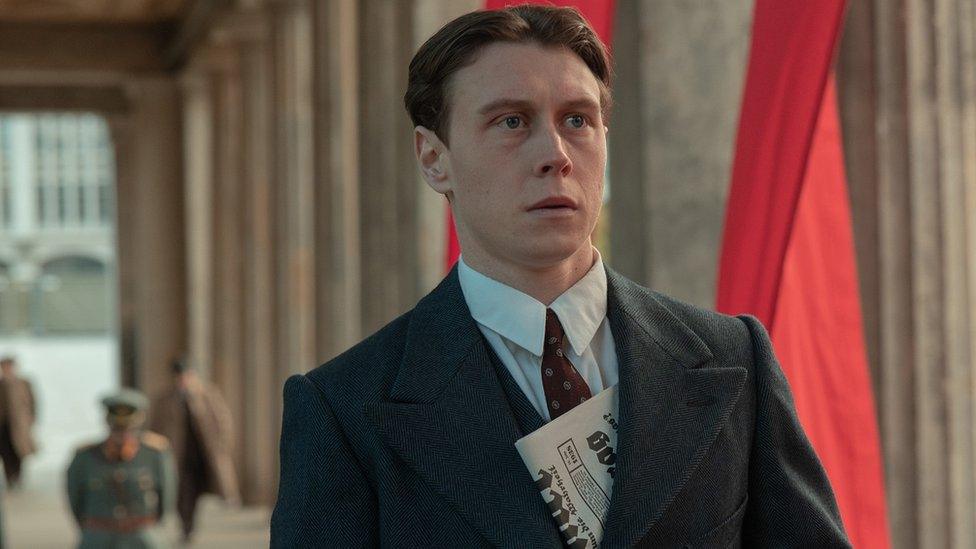
Mackay is best known for his role in World War One drama 1917
It was filmed using the real locations from the 1938 Munich conference, along with a German-speaking cast.
"It was very important to have a German director and the language to give it a sense of reality," Irons explains, "otherwise, one could see it becoming classical English historical drama and that's what we didn't want. Audiences have come to expect that real casting and they're better at dealing with subtitles."
1917 actor George MacKay co-stars in the film with Irons, playing a fictitious young British diplomat, Hugh Legat, who discovers at the Munich conference that his German friend Paul von Hartmann (Jannis Niewöhner) is plotting to assassinate Hitler.
"This idea of friendship in two countries driven apart by political forces has some resonance now," Harris believes.
"One has sympathy with young people now. For me and Jeremy, the world seemed a better place in our twenties. Democracy feels like it did in the 1930s - rather fragile."
Mackay adds that he believes his first reading of the script came at a similar time of turmoil to 1938.
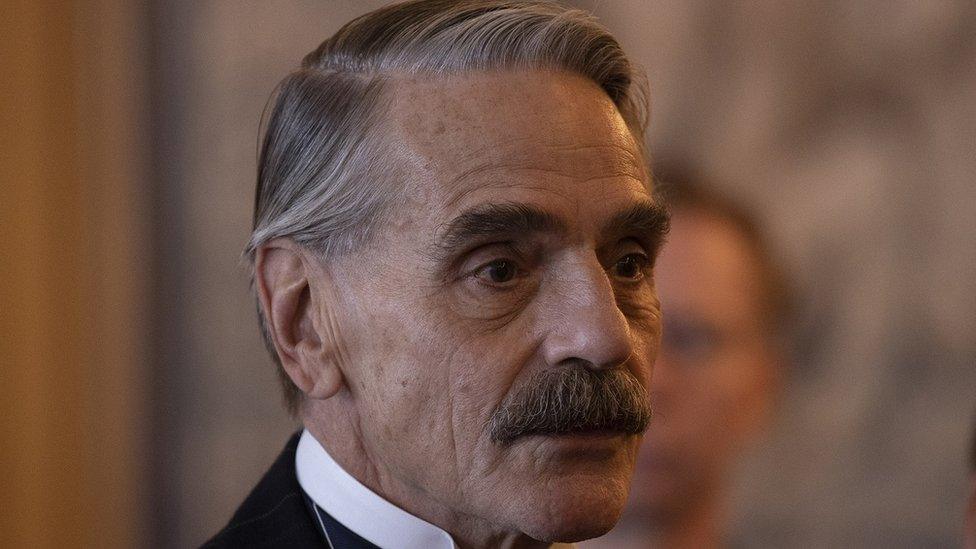
"Sadly, it felt like an equivalent moment of history to what happened before World War Two, it also deals with a time when the characters in the film haven't got the benefit of hindsight but just have a gut instinct, an impending feeling, of going into something very, very serious if they don't take action," he says.
"When I read the script, it wasn't too long before the Trump/Biden election," MacKay recalls. "The summer I read it was also the time of the Black Lives Matter movement, and lockdown, and discussions about climate change."
The actor adds: "It feels like almost daily there are monumental things being discussed with monumental ramifications and we're all considering how best to go about them."
But how will audiences react to a plot to assassinate Hitler and avert war, when the ending is well-known?
Variety's Guy Lodge said, external the historical drama "is unavoidably sapped of tension by our knowledge of precisely what happened next, though it's gripping enough on an in-the-moment basis".
Deadline's Anna Smith similarly felt, external the film was a "gripping watch but not a nail-biting one, given the inevitable tragic outcome".
"Some characters and situations may be fictional but this is not revisionist history in the broader sense," she wrote. "And so, with the ending well known from history, the onus is on the actors and themes to engage, which they do well."
Schwochow says that the question of whether war could ever have been prevented gives the audience a dilemma to ponder.
"I can't give an answer of whether it would have been a good thing to assassinate Hitler in 1938. Of course, with the knowledge of today, we know a lot of evil would not have happened, but does this entitle us to kill someone? It's a very important moral question," he says.
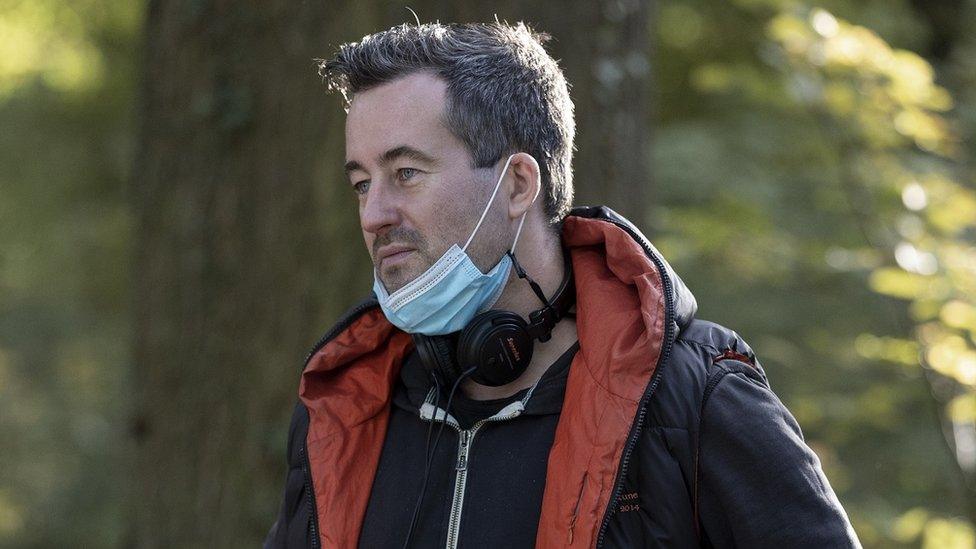
Schwochow says he wants to get a message across to younger audiences
"Do we believe in the Neville Chamberlain way of doing diplomacy, the silent way? He was a very silent politician, not like the Trumps of the world and the noisy politics we have today. I wish we had more politicians like him today, who believe in the power of diplomacy, who believe in peace.
He says the film's most important message is to young contemporary audiences.
"You have to stand up rather than doing nothing, because doing nothing is the worst. Whether young people decide to protest, or just get debating, something has to be done.
"It's a story for today as the world has more and more dictators, and the question is: what we do about them?"
Munich - The Edge of War is in select cinemas now and on Netflix from 21 January.
Related topics
- Published30 September 2013
